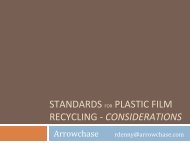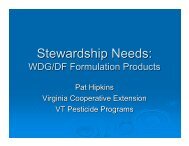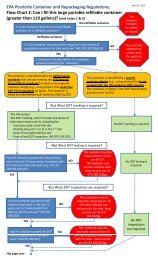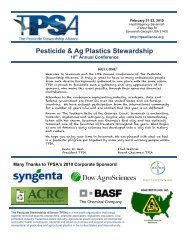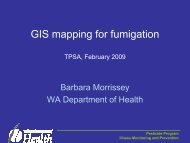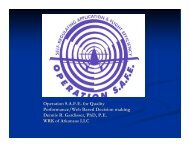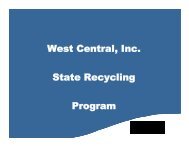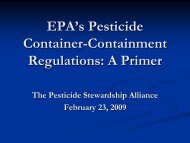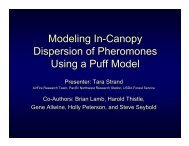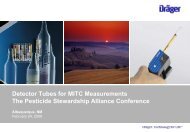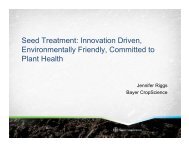Clean Sweep Programs - US Environmental Protection Agency
Clean Sweep Programs - US Environmental Protection Agency
Clean Sweep Programs - US Environmental Protection Agency
- No tags were found...
Create successful ePaper yourself
Turn your PDF publications into a flip-book with our unique Google optimized e-Paper software.
Section 5 ObservationsUsing a variety of approaches, <strong>Clean</strong> <strong>Sweep</strong>programs in 46 states have collected and disposedof more than 24 million pounds of unwanted pesticides,which may otherwise have seeped out ofdeteriorated containers and contaminated soil andgroundwater. Using predominantly state resources,11 states have collected over a million pounds ofpesticides, and the 21 states with permanent fundinghave collected more than 70 percent of the wastepesticides collected nationwide. Participation hasexpanded from exclusively farmers and ranchers toinclude residential and institutional pest controloperators, government agencies, golf course ownersand others. Although many of the collected pesticideswere canceled years ago, currently-registeredpesticides are the most commonly collected materials.After examining the states’programs, EPAhas made observations about several major issuesfacing these programs nationwide. This sectiondiscusses the advantages of permanently fundedprograms, the costs of <strong>Clean</strong> <strong>Sweep</strong> programs, theamounts of unwanted pesticides still needingdisposal, the relationship between quantities usedand quantities disposed, and the continued need for<strong>Clean</strong> <strong>Sweep</strong> programs.5.1 Permanent funding has manyadvantages.The 21 states with permanently fundedprograms have collected over 70 percent of all thewaste pesticides nationwide while conducting over60 percent of the annual collections. The obviousprincipal advantage of permanent funding is thatprogram managers have predictable funds everyyear or every few years, and can, therefore, devotetheir energy to program implementation. Withpermanent funding, managers can think long-term,can plan for phased state-wide collections, and canestablish long-term contracts with waste haulers.An established, funded program builds trustin the community and gives farmers and otherparticipants a sense of confidence that <strong>Clean</strong> <strong>Sweep</strong>programs are beneficial to participants and theenvironment. Participants learn through theexperiences of neighbors, and program staff canplan successful outreach efforts and target differentgeographical areas each year so as to cover anentire state.Permanently funded programs give programmanagers greater waste management contractingflexibility, including options to negotiate long-termcontracts. As discussed in section 2.13, theadministrative strategies that allow for programefficiency require considerable coordination andplanning between the manager and the contractor.The more stable the program and vendor relationship,the greater the chance that the advantages ofadministrative options can be fully realized. Whenmanagers have the time to research and understandadministrative options, they can move from low-bidcontracts to “request for services proposals.”Short-term contracts leave little room for vendors towork toward more efficient, long-term solutions, andput the burden on program managers to identify allneeds in the bid documents.Also, program managers of well-fundedprograms have the flexibility to alter or expandservice formats. For example, satellite sites,permanent sites, combined household and agriculturalcollections, multi-county and multi-daycollections, and on-site pick ups to reduce customertravel time and increase convenience are optionsavailable only to those states with established,assured funding.57



